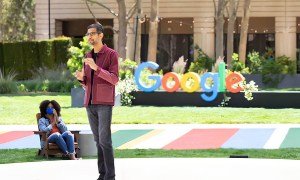

During today’s Google I/O’s opening keynote, Senior Vice President Amit Singhal showed off how the new and improved Google Search can better answer, converse, and anticipate your questions so you can better tap into all the knowledge available on the Internet.

You can already use your voice to search Google on your mobile devices, but you have to tap on the red mic icon before you can put the search engine to work. If you need to resort to using your voice to search the Internet, your hands are probably tied up cooking or driving, so why should you have to touch the screen to activate this feature?
With the “conversational search” that Google introduced today on stage at I/O, you’ll be able to say your questions to Google out loud, and it will be able to respond with contextually-correct answers whether you’re using the Chrome Web browser on your smartphone, tablet, or computer.

All you have to do is start your questions with “Okay, Google,” so the search engine knows when to start listening, and it will speak its answers to you when it’s ready. And it’s already a smart conversationalist. In the keynote demo, Johanna Wright, Google’s vice president of search and assist for mobile, asked Google “How far is Santa Cruz from here.” Interestingly enough, she didn’t have to specify that “here” refers to the San Francisco’s Moscone Center because Google Search remembered that detail from a previous search. The search engine was able to correctly anticipate her real question and give her the answer she was looking for.
This voice search feature isn’t limited to the Internet, either; it’s also capable of search through your local device to answer your questions. For example, Wright was able to ask Google Now to set a reminder to contact a friend on an upcoming trip to New York City, as well as ask her phone to locate her photos from a previous trip to the city, with just her voice.

In addition to making Google searchable by voice, the search giant also expanded the ability of the Knowledge Graph to map out knowledge of real-world people, places and things. Plus, it added four new languages: Polish, Turkish, and Simplified and Traditional Chinese.
Starting today, you’ll be able to ask Google to show you Canada’s population, and it’ll automatically queue up some common follow-up questions like how does it population compare with California or Australia, according to its press release.
We can’t wait to find out what else Google has in store for us at I/O. Stay tuned!

